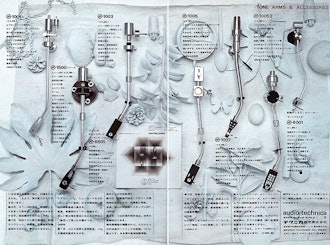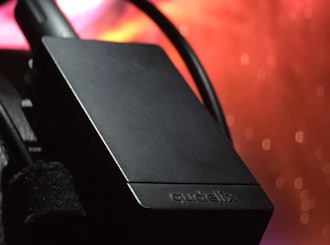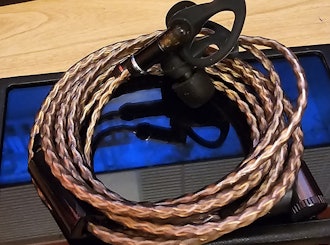Click to view our Accessibility Statement or contact us with accessibility-related questions


















Showing 1 of 127 conversations about:
Audiopro
167
Apr 3, 2019
bookmark_border
Break in: I do believe that mechanical portions of your audio equipment (Speakers, headphones, microphones and maybe phono cartridges do benefit from a certain amount of break in over time. I prefer to refer to this as "settle in" time where a vibrating component tends to relax into its normal operating condition. Some items take more time, some less. I don't think this is a critical step as once use begins, this will take place anyway. Additionally, you may or may not even notice, or as one of my fellow professionals says, "you can get used to any speaker you choose to use." Some manufacturers even do this at the factory, before packaging, as just one more quality control step.
Amplifiers: The big improvements in amplifiers are the quality of the small parts, i.e. capacitors. resistors, transistors and FETs. Class A, AB, D etc., have not changed drastically recently but the afore mentioned improved component parts have allowed these designs to perform better.., but not to the tune of thousands of dollars more. The parts quality gains, mentioned, represent only small gains in the finished product's performance, the designs are basically similar to the same.
Tubes vs Transistors: It is true that there is a difference in sound between components built with either devices. There are many reasons not the least of which is the natural tendency of tubes to distort in a very pleasant way (even order harmonic distortion), while transistors naturally lean toward odd order harmonics, or not as pleasant. Also output transformers, in tube gear, have an effect on the final sound we hear leaning toward the warm, slightly boated, side. Again modern improved parts have begun to close this gap somewhat. Personally, I use solid state amps in my studio since they either work or they don't, and provide a long term reliable, unchanging reference. For relaxed listening, I prefer tube amps, or hybrids, but tubes, due to heat, deteriorate slowly over time.
Wire: This is a tricky one as it's been disproved as much as proved, through blind testing, whether the differences in wire can actually be heard. I am especially suspicious of a 6 foot AC cord getting rid of all the hash collected along MILES of power lines before entering your home. As I once told members of a local audiophile club " we couldn't afford to pay, $6 - $50+ per foot, what you guys are willing to spend for exotic wire.., we couldn't afford the rest of the recording gear for the studio. Typically, we run hundreds of feet." I got blank stares indicating a rejection of information both scientific and financial, in favor of mythical beliefs. OK!, moving on then. Ironically, the very recordings, highly revered, by these individuals are made with wires purchased in bulk rolls at roughly $0.33 a foot, or less, by manufacturers of pro grade cable. I rest my case.

LuckyLuke575
561
Apr 13, 2019
bookmark_border
sulaco33I'm inclined to agree with that notion. If the sound of the headphones improves with normal use over time, then I'm perfectly happy with that. But I'm not in favor of letting my stuff play aimlessly.
On the other hand, I've recently purchased a high end custom cable, and the guy that made it indicated that all the cables are run for 12 hours before shipping, specifically for burn in purposes. And this dude knows that he's talking about.
Audiopro
167
Apr 17, 2019
bookmark_border
sulaco33You have a point.Cranking up your speakers or headphones to volume levels you wouldn't normally listen to for the sake of speeding up a break-in is tantamount to downright abuse. As you suggests, normal use over a period of time is a far better approach and will not BREAK either device. So, we're talking break-in vs BREAKING..
Mowgli66
11
May 13, 2019
bookmark_border
AudioproSpeaker wires, I agree. As long as the guage meets the length rquirement the difference are small. Interconnects are very different.
Audiopro
167
May 14, 2019
bookmark_border
Mowgli66I apologize for not including interconnects, in particular, which, as you say, are quite a different story. Inerconnects are carrying a much smaller signal which is more delicate and susceptible to interferences not shared by current carried by speaker cables a much higher level signal. While I didn't specify, the hundreds of feet of studio wires mentioned, are the pro equivalent of interconnects. Thanks for the heads-up Mowgli66.
Related Posts

storyboardtech
Finding your groove: getting into vinyl with Audio-Technica
I’d like to think that I could’ve been friends with the late Hideo Matsushita, founder of Japanese Hi-Fi powerhouse Audio-Technica. If I could, I’d travel back in time to 1960’s Tokyo, where a young Matsushita curated “vinyl listening sessions” at the Bridgestone Museum of Arts, exposing visitors to the sounds and possibilities of high end audio and the warmth of vinyl records. I imagine sitting with him in a mod coffee shop, listening to the stories of what he witnessed in those sessions, the conversations he had with visitors, and what ultimately motivated him to head back to his small apartment above a ramen restaurant and start an audio company of his own. In the histories I’ve read regarding AT’s humble beginnings, Matsushita’s motives seem clear. Produce high end audio at affordable prices, bringing audio excellence into spaces and to customers that simply didn’t have access to it before. His first two products, the AT-1 and AT-3 phono cartridges did exactly that, and...
Dec 6, 2023
bizarcane
I'm interested to learn about the fit of these IEMs; from an outward appearance, they look like they're designed to pop right out of the ear. I can't see a structure that might help them sit within the ear well. Anyone have insight here?
Apr 19, 2024

Paulskii
Are there any official/unofficial replaceable headbands/head cushion for the DT 177X GO? My current one has gone through some wear and tear and is in need of being replaced. Anybody have any sources they can share?
Apr 19, 2024

monte543
This says "Estimated ship date is April 19." Is it still ok for me to make the purchase on the 20th or 21st?
Apr 16, 2024

Viltaria
Would Drop be able to provide power-adaptors (plugs) for those based in other regions (Euro, Oceania, Asia, etc)?
Apr 14, 2024
Trending Posts in Audiophile

Simthaniel
Rigs
Modded headphones with qudelix at the core
When I received the Qudelix 5K, I had already modified a pair of Superlux HD-681 headphones. I previously soldered my own balanced connections to the drivers, providing multiple ways to connect and...
Apr 14, 2024

brothamike
A decent set of IEMs
I am in the midst of a 300 hour burn-in but, I will say I am enjoying how this set sounds so far. Before I received these which was btw late by a few weeks, I purchased a Sony/Kimber Kable MMCX...
Apr 12, 2024
merrick97
Should I exchange the PC38X for better headphones?
I bought the PC38X headphones FOR GAMING and they are great, but I have NO use for a Microphone since I don't do competitive gaming and I was wondering if there were better headphone options at a similar price without a headphone, where (presumably) more of the cost was put into making it sound better. I also find that my PC38X don't get quite as loud as I would like and I was wondering if a cheap amp like the iFi Go link would draw a little more volume out of my phones. https://www.amazon.com/dp/B0BN6MM822?psc=1&ref=ppx_yo2ov_dt_b_product_details I went with the PC38X since it was considered the best bang for buck headphones. I care most about using spatial apps like DOlby Atmos and DTS Headphone:X. Suggestions are welcome.
Apr 11, 2024

LostnAmerica
Sound Signature of the Grell Project.
Wondering what type of sound signature the Drop Grell project headphones will have or trying to attain. Any update would be appreciated.
Apr 8, 2024

Fabulous
Looking for a gaming/content audio setup
Hello! I'm looking for recommendations on audio setups. I'd be planning on using it mostly for gaming. Preferably I'd like a pair of large closed back headphones since I have a big head and jaw. I'd also like to hear myself through my mic with mic monitoring. As far as budget goes, I don't really have one. But under 600$ would be nice. I can go higher if needed. The audio setup would be connected to a high performance PC. Thank you in advance for any recommendations!
Apr 4, 2024

1plsd
$10 Drop Coupon Email not sent?
Trying to buy some gear off Drop for the first time. I was told I would receive an email with a welcome to drop $10 off promo. I never received that email. Drop was able to send me emails for my login token and email for Password update. But for some reason the $10 off coupon was never sent to me.
Mar 31, 2024

NMPacella
New here
Hello, I just joined, primarily for the audiophile products. Looking at purchasing the NHT C3 speakers for our new living room. Space is about 15 feet wide by 33 long and they will fire long ways. Space is just for general listening, music room with all equipment is downstairs, so hoping they will fill it with sound nicely. Cheers.
Mar 18, 2024



